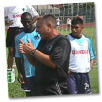Chasing Numbers
How often in training are we just chasing numbers rather addressing all components of athletic development? Numbers like Max VO2, max bench press, max power clean and 40 yard dash times are numbers – what do they mean? Do they really transfer to performance improvement or are they artifacts, mere curiosities that people have latched onto as being significant? I think we need to challenge conventional wisdom and see where these numbers fit into the big picture of athletic development. There is no doubt that it is easy to get caught up chasing numbers, and see better numbers, but what do those numbers really mean?


4 Comments:
Depending on where you employed chasing numbers may have to become important to you because its important to your customers. Customers, especially parents want to "gauge" the effectiveness of the training program by the results you achieve. Besides a better 40 yard dash time, the athlete has also improved in self confidence, balance, dedication, drive, and other areas that are unmeasurable.
The training needs to be designed to not only improve in the testable areas- speed, agility.... But also to give the athlete the best chance to achieve.
The customer has their gauge to show how much they've improved in the areas they care about, and also to prepare them physically to be an all around better athlete by addressing the areas they don't even know they need to improve in.
Mark Crabtee MS,ATC,CSCS
Vern-
This is an excellent post and one that I believe should be carefully considered by coaches, athletes, S/C people (athletic development is really a much better term!)AND parents. (Isn't it the job of the "pros" to educate their customers?).
I have been a college baseball coach (in charge of my own development program), a scout, am now a sport psychologist/professor/ consultant. I also have a son who is a budding athlete as a soph in HS. Here is the problem you so astutely point out. The "numbers" simply measure the athlete's tools (baseball has 5 tools). But how does the athlete USE those tools in performance environs (real games!)?
Certainly we have all seen athletes who have great tools (run, jump, throw, great strength, etc.)....but can't PLAY (see NFL combine, MLB draft 1st round). Why? Perhaps they have developed the tools in isolation, or they are poor decision makers. Again, context...train within the context of the sport. And also, "physical" tools and their development often neglect "mental/emotional" tools.
Yes, improvements in numbers MIGHT develop drive, confidence, etc. but it is not a given that these things carry over. Thanks for the thought-provoking post Vern.
Paul Davis
Omaha,NE
Not sure if any smart strength and conditioning coach will 'chase numbers' . GPP is where measurements can be done and progress measured. But we know It only indicates a general physical adaptation. The real danger is when games coaches mix up game skills and physical fitness in assessment and training. If the training is right the results will show in the actual game. But arbitrary testing of movement or skill is as dangerous as chasing numbers.
HI Vern
Brent Rushall wrote an excellent letter to Alan Roaf, Director of Canadian Rowing a while back with regards to the "numbers" in sport.
It is on his webpage Coaching Science Abstracts and is called Practicing for Sports - Mind is More Important Than Matter
http://www-rohan.sdsu.edu/dept/coachsci/csa/vol31/rushall1.htm
Jamie
Post a Comment
<< Home